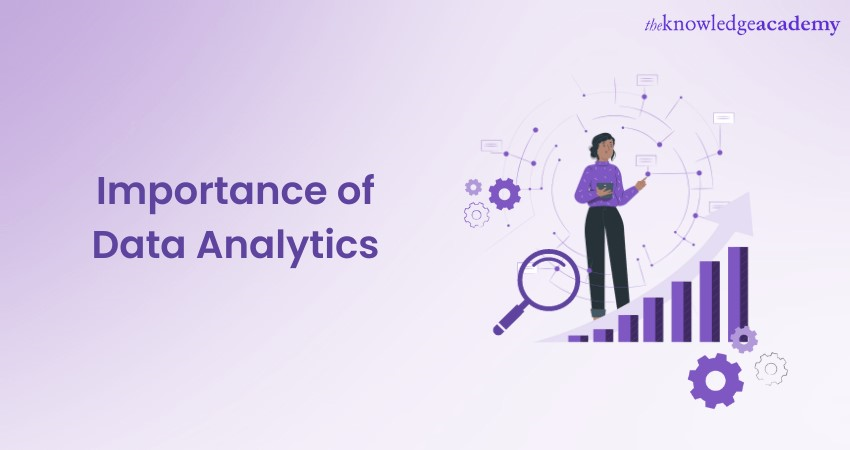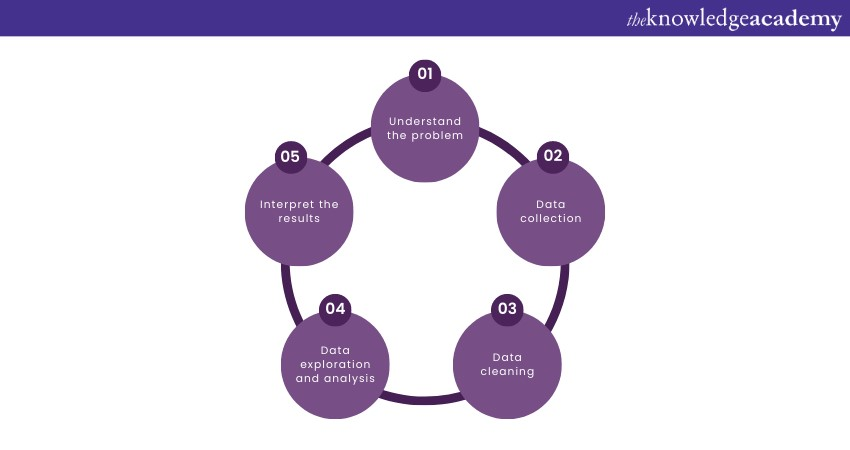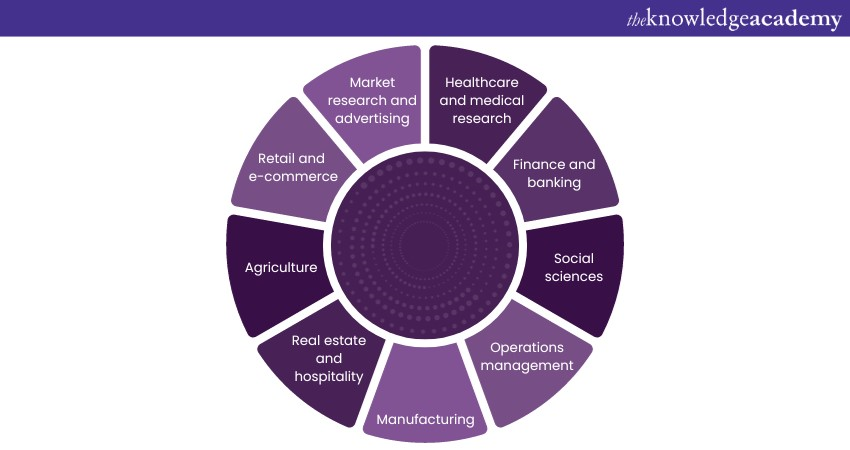We may not have the course you’re looking for. If you enquire or give us a call on 01344203999 and speak to our training experts, we may still be able to help with your training requirements.
Training Outcomes Within Your Budget!
We ensure quality, budget-alignment, and timely delivery by our expert instructors.

The adage of “data is the new oil” prevalent during the early parts of the 21st century has quickly become obsolete. Careful observation will reveal that with each new application being developed and released into the market, the amount of data being collected is surpassing any possible estimates from a few decades ago. The emergence of this data has increased the importance of Data Analytics to both businesses and professionals.
According to IBISWorld, the Business Intelligence and Analytics Software market size in the industry was around £782.2 million in 2022, and the average growth rate has been 6.8% per year over the past five years. These trends point towards a rapidly growing market with an increasing demand for analysts and Data Analytics professionals and the emergence of new verticals and data-driven organisations in the next couple of decades. Learn about what Data Analytics is, the importance of Data Analytics in business, and its applications in 2023 by reading this blog.
Table of Contents
1) What is Data Analytics?
2) Importance of Data Analytics
3) Applications of Data Analytics in 2023
4) Conclusion
What is Data Analytics?

Data Analytics is the process of collecting, transforming, and analysing large volumes of data to gain insights, patterns, and trends that inform decision-making and drive improvements. It involves using various tools, techniques, and algorithms to examine data and extract valuable information. This, in turn, enables businesses and organisations to make data-driven decisions and thus gain a competitive edge.
The data used in analytics can come from various sources, including structured data like databases and spreadsheets and unstructured data like text, images, and videos. There are different Types Of Data Analytics, such as descriptive analytics, which summarises and describes the data. Diagnostic analytics, which identifies the cause of past events; predictive analytics, which forecasts future outcomes; and prescriptive analytics, which suggests actions to achieve desired outcomes.
Data Analytics is widely applied in various fields, including business and marketing, healthcare, finance, manufacturing, social sciences, and more. It allows organisations to harness the power of data to understand their operations better, identify opportunities for growth, and address challenges effectively. Additionally, Data Analytics continues to evolve with advancements in technology and the growing availability of big data, providing even greater potential for organisations to derive value from their data and increasing the importance of Data Analytics.
Unlock the power of data with our Advanced Data Analytics Certification Course - sign up now!
Importance of Data Analytics
Data Analytics has been a crucial component in running businesses and the decision-making processes since the advent of the century, and its importance is likely to continue growing as the technology keeps evolving. Here are some vital points highlighting the importance of Data Analytics in 2023:
1) Data-driven decision-making
Data Analytics enables organisations to make informed and data-driven decisions. Instead of solely relying on intuition, gut feeling, or anecdotal experiences, data-driven decision making involves using data to gather insights, identify patterns, and draw conclusions, ultimately guiding the decision-making process. By analysing data in large volumes, businesses can gain invaluable insights into customer behaviour, market trends, and operational efficiency, helping them make strategic choices for growth and success. Data-driven decision-making often tends to be objective, unbiased and less influenced by personal preferences or biases.
2) Competitive advantage
In today's competitive business landscape, companies that can effectively leverage Data Analytics have a distinct advantage. Analysing data can provide unique insights into customer preferences and behaviour, giving businesses a pivot to customise their products and services to meet specific customer needs, thus gaining a competitive edge. Businesses can analyse a range of variables, from pricing strategies to marketing and branding campaigns and even customer feedback and reviews, using the data gathered to adapt and refine their strategies over immediate rivals in the industry.
3) Personalisation and customer experience
Data Analytics plays an important role in understanding individual customer preferences and behaviour. By analysing customer data, businesses can personalise marketing campaigns and improve customer experience, leading to higher customer satisfaction and loyalty. By using techniques like customer segmentation, predictive analysis, sentiment analysis, customer churn prediction and feedback loop integration, businesses can create a more personalised and seamless experience, which can lead to higher customer satisfaction, loyalty and customer advocacy. Most businesses are evolving towards a customer-centric market approach today, and Data Analytics provides the insights to stay ahead of the competition.
4) Operational efficiency
Data Analytics helps organisations optimise their internal processes and operations. By identifying inefficiencies and bottlenecks, businesses can streamline workflows, reduce costs, and improve productivity. The use of techniques such as process optimisation, resource management, supply chain optimisation, predictive maintenance and real time monitoring can give businesses deep and key insights into their operations and identify opportunities for improvement. Embracing data-driven approaches empowers businesses to optimise processes, resources, and performance, leading to cost savings, productivity increase, and a competitive advantage in the marketplace.
5) Predictive analytics and forecasting
With advances in Data Analytics, businesses can use predictive modelling and forecasting to anticipate future trends and outcomes. This enables proactive planning and risk management, helping businesses stay ahead of challenges and opportunities. Predictive analysis involves the use of past data to build models and make predictions about future outcomes. The aim of predictive analytics is to identify patterns and relationships within the data to forecast what is likely to happen next.
6) Fraud detection and security
Data Analytics helps identify patterns of fraudulent activities and potential security threats. Analysing large volumes of data enables businesses to identify patterns, anomalies, and suspicious activities that may indicate fraudulent behaviour or security threats. Using the collected data, organisations can proactively detect and prevent fraud, safeguard sensitive information, and protect against cyberattacks. Using Data Analytics Tools and methods such as anomaly detection, network traffic analysis, behavioural analysis, fraudulent transaction analysis, geolocation tracking, data correlation, and identity verification can be performed.
7) Internet of Things (IoT) and Big Data
As the Internet of Things continues to expand, Data Analytics will be crucial in processing and extracting invaluable insights from the vast amounts of data generated by IoT devices. IoT involves connecting everyday objects, machines, and devices to the internet to collect, exchange, and analyse data, creating a network of interconnected smart devices. Data Analytics in IoT helps make sense of this data and enables organisations to optimise operations, perform predictive maintenance, implement real-time monitoring and alerts, improve healthcare and remote monitoring, optimise supply chains and much more.
8) Healthcare and research
Data Analytics is transforming the healthcare industry by aiding in medical research, disease diagnosis, treatment optimisation, and personalised medicine. Data Analytics helps in disease diagnosis and prediction, drug discovery, clinical trials, population health management, healthcare resource management, telemedicine, genomic data analysis, Healthcare operations and quality improvement, and much more. Data Analytics in Healthcare and research has revolutionised the field, bringing transformative changes in how medical data is analysed, interpreted, and utilised. The integration of Data Analytics is enhancing the speed, accuracy, and efficiency of various processes, leading to better patient outcomes, scientific advancements, and more data-driven decision-making.
9) Supply chain optimisation
Data Analytics is a powerful tool in supply chain management, offering valuable insights that can optimise various aspects of the supply chain. By analysing large volumes of data generated from different stages of the supply chain, businesses can make data-driven decisions, improve efficiency, reduce costs, and enhance overall performance. Using demand forecasting, inventory management, supplier management, warehouse optimisation, risk management, and improved supply chain visibility, businesses gain important insights, make informed decisions, and enhance the efficiency, responsiveness, and cost-effectiveness of the supply chain.
10) Data privacy and governance
With the increased emphasis on data privacy and compliance regulations, Data Analytics will play a significant role in ensuring data governance and adherence to data protection laws. D Data privacy and governance encompass a set of policies, procedures, and controls that safeguard sensitive data, adhere to regulations, and maintain data integrity. By leveraging Data Analytics in data privacy and governance, organisations can proactively manage data risks, ensure regulatory compliance, and maintain the trust of customers and stakeholders. These efforts are critical in an increasingly data-driven world, where protecting sensitive information is of utmost importance.

Applications of Data Analytics in 2023

Data analysis is used across various industries and disciplines to extract valuable insights, patterns, and meaningful information from raw data. Data Analytics has a crucial role to play in decision-making processes, problem-solving, and gaining a deeper understanding of various phenomena. Here are some common uses of data analysis across industries:
1) Retail and e-commerce:
Data Analytics helps in demand forecasting, inventory management, customer behaviour analysis, personalised marketing, and recommendation systems.
2) Market research and advertising
Market researchers use data analysis to analyse survey responses, customer feedback, and demographic data to understand consumer preferences, market trends, and competitor analysis. It also helps marketers analyse consumer behaviour, campaign performance, and customer segmentation, enabling targeted and personalised marketing strategies.
3) Healthcare and medical research
Data analysis is essential in healthcare for patient outcomes analysis, disease diagnosis, treatment optimisation, and clinical research. It helps medical professionals make evidence-based decisions and improve patient care.
4) Finance and banking
Financial analysts use data analysis to evaluate investment opportunities, track financial performance, and assess the risk associated with financial decisions. Data Analytics has transformed the financial sector by providing valuable insights, enhancing decision-making processes, and improving overall efficiency and risk management. In the financial industry, Data Analytics is used across various domains, including banking, insurance, investment, and financial services.
5) Manufacturing
Data Analytics in the manufacturing industry helps drive improvements in production processes, quality control, supply chain management, and overall operational efficiency. Some key applications of Data Analytics are in predictive maintenance, quality control and defect detection, energy management, warranty and maintenance analysis, product lifecycle analysis and inventory management.
6) Social sciences
Researchers in social sciences use data analysis to study human behaviour, conduct surveys, and analyse demographic data for various studies. Data Analytics has become increasingly important in social sciences, transforming the way researchers study and understand human behaviour, societal trends, and various social phenomena. It enables social scientists to analyse vast amounts of data, often collected from diverse sources, to derive insights and make evidence-based conclusions.
7) Operations management
Data analysis is used to optimise supply chain management, inventory control, and production processes, leading to improved operational efficiency and cost reduction.
8) Real estate and hospitality
Data Analytics assists in property valuation, market trends analysis, and investment decision-making while also aiding in customer satisfaction analysis, revenue management, demand forecasting, and personalised guest experiences.
9) Agriculture
Data Analytics is revolutionising the agriculture industry by providing farmers and agribusinesses with valuable insights and tools to optimise crop production, improve resource management, and increase overall efficiency. Using remote sensing and satellite imagery, precision farming, smart irrigation, livestock management, weather and climate analysis, and pest and disease management, farmers and agricultural businesses can optimise their operations, increase productivity, minimise resource wastage, reduce environmental impact, and ultimately contribute to global food security.
Embark on a data-driven career journey with our Data Science Analytics Course – join now!
Conclusion
In summary, Data Analytics is fundamental to driving business growth, improving decision-making processes, enhancing customer experiences, and gaining a competitive advantage in the rapidly evolving digital landscape. As data continues to increase in volume and complexity, the importance of Data Analytics will only grow in 2023 and the years to come.
Want to take your data skills to the next level? Explore our Big Data and Analytics Training Course today!
Frequently Asked Questions
Upcoming Data, Analytics & AI Resources Batches & Dates
Date
 Advanced Data Analytics Course
Advanced Data Analytics Course
Mon 12th Aug 2024
Mon 9th Dec 2024







 Top Rated Course
Top Rated Course


 If you wish to make any changes to your course, please
If you wish to make any changes to your course, please


